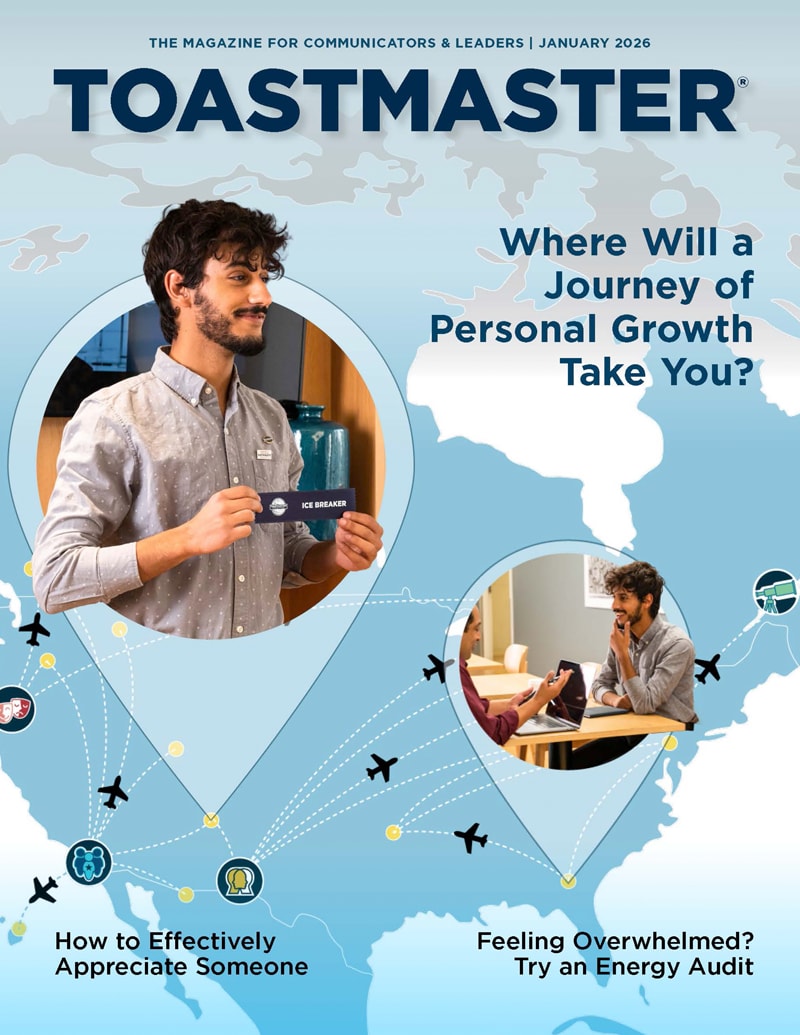
Congratulations! You are now a Toastmaster. Welcome to the family. You have embarked on a journey—a journey to improve your speaking and leadership skills. Your club and manuals will give you a great start.
The Competent Communication (CC) and Competent Leader (CL) manuals are designed to be worked side-by-side. In June we will take an in-depth look at the CL manual. But this month, I’ll give you a few tips to help you get the most out of your CC manual.
Tip #1: Getting to CC is not a race.
If you are goal oriented like me, it is easy to want to get your Competent Communicator designation as quickly as possible. I frequently hear people say something like, “I made it to CC in three months.” I used to be impressed. Now I’m not.
The problem with that statement is you don’t become a competent speaker by completing a manual. You become competent by mastering the skills taught in the manual.
You have no doubt noticed that the CC manual consists of 10 projects. These are not simply speeches, they are learning projects. And projects and learning take time and effort.
Each project teaches a new component of speaking. After the Ice Breaker (Project 1), we learn:
Project 2: Speech organization
Project 3: How to stay focused on the purpose of the speech
Project 4: The use of rhetorical devices; good grammar; short, concise, descriptive words
Project 5: Body language
Project 6: Vocal variety
Project 7: Presenting a topic that you have researched
Project 8: The effective use of visual aids
Project 9: How to be persuasive
Project 10: How to be inspirational
What frequently happens, though, is that a Toastmaster writes a speech for Project 2. They then write another Project 2-level speech for Project 3—ignoring the “purpose.” And they continue that for projects 4, 5 and 6. In fact, many times I have heard the speaker use less vocal variety in the vocal variety speech than they did in their previous five speeches. Why is that? Because they don’t put in the time to learn the new skill and are in a hurry to get the speech over with as quickly as possible to get that CC.
When you take on one of the CC projects, don’t start with writing the speech. Start with learning the information in the manual. Then work to incorporate the lessons you learn into your speech. And don’t be afraid to push the envelope. For example, when working on the rhetorical device speech, make it rich with triads, alliteration and metaphors. When focusing on the body language and vocal variety speeches, be very expressive. Stretch yourself. You will be amazed at how much you will learn that way.
Tip #2: Map out your speech topics early.
I have seen many Toastmasters become paralyzed because they don’t know what to speak about next. I recommend that you sit down today and start a list of potential speech topics. Carry that list around with you and add new topics as they come to mind. It is always easier to come up with topics when you aren’t under the pressure of a deadline.When you have a good topics list, review it and ask yourself, “Which one would enable me to use a high level of body language? Which one would best lend itself to vocal variety? Which one is a research topic?” … and so forth. I had mapped out my speech topics through Project 8 before I began Project 2. And that took a big load off of my mind.
Tip #3: Use your mentors.
Your club has, no doubt, assigned you a mentor. This person will assist as you write your first speeches and guide you in the various meeting roles.
You may be thinking, “Of course I would use my mentor.” The truth is—many do not. In fact, more times than not, my mentees haven’t even returned my phone calls. Big mistake! Don’t be like them. Embrace your mentor. He or she is a resource who can greatly enhance your Toastmasters experience.
You will note, however, that I wrote “mentors.” You should have an officially assigned mentor, but you aren’t limited to talking to just that one person. You will figure out real soon that there are some members in your club who stand out as strong speakers. Ask them for their input. Most will be glad to give you some tips.
Those are just a few points to keep in mind as you begin your Toastmasters journey. It is easy to get caught up in the rush to get speeches done. Instead, get caught up in mastering the art of the speech. What a difference it will make.
Bill Brown, DTM is a speech delivery coach in Gillette, Wyoming. He is a member of Energy Capital Toastmasters in Gillette. Learn more at billbrownspeechcoach.com.



 Previous
Previous
 Previous Article
Previous Article